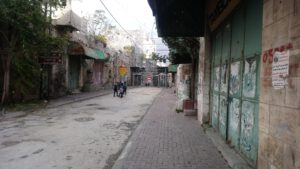The Project in Palestine and Israel
Many of today’s generation of young adults from Israel and Palestine, as children, experienced the positive spirit of optimism after the Oslo negotiations. After that, their youth was marked by the second Intifada, many lost close relatives or friends.
The Palestinians in the West Bank and East Jerusalem are being forced back into enclaves by the construction of the Israeli wall and the ongoing settlement construction, which is also condemned by the United Nations. The prospect of an independent state moves into the far distant future. The situation is increasingly perceived as hopeless and most Palestinians shy away from dialogues with Israelis and are reluctant to accept rash demonstrations of sympathy or even friendship. They demand justice and an end to the Israeli occupation. Many times, in the dialogue seminars they hear for the first time about the scale of the horrors of the Holocaust and World War II and the importance of the state of Israel for the Jewish Israelis.

Conversely, Israeli participants in seminars often hear of the catastrophic effects of the occupation on Palestinian life for the first time. At the same time, they describe the atmosphere in Israel as similarly pessimistic and for many, the fear of terrorist attacks is regularly present in their everyday lives. People lack the belief in a peaceful coexistence with the Palestinian side, which leads to a noticeable delimitation and a strengthening of the conservative forces. The dialogue also means a confrontation with one’s own fears, many people miss partners on the other side who have acknowledge their existence and make it possible for them to act differently.
The Palestinian participants, for their part, see themselves threatened in their existence and do not feel their suffering recognized. These fears, the anger and a negative attitude are accorded to them during the two weeks together, which in the end can lead to an honest convergence, sometimes even to friendships and a joint motivation to work to change the hostility- and injustice-driven reality of occupation.
